
|

|
Forum Index : Microcontroller and PC projects : BBQ - Thermal Probe To a MM170?
| Page 1 of 2 |
|||||
| Author | Message | ||||
| Andrew_G Guru Joined: 18/10/2016 Location: AustraliaPosts: 874 |
Hi all, Its that time of year (in Aus) when the BBQ gets dusted off (I have a nice new one so it is still clean-ish). I've been looking at connecting a thermal probe like this (just the probe and "cable") to a MM170 with an LCD to show the internal temperature of the meat. Yes there are products that do this - ranging from Au$80 to Au$150 (with an App to a phone - not my thing). The one above is a Weber version and the probe costs only $20. It has a simple mono-jack at the end of heat-insulated two-conductor cable. The probe stays in the meat on the BBQ. A second probe could read the BBQ temperature. I suspect that the probes don't have a long life? My understanding is that they work by the resistance changing with temperature - this could?? be picked up by a MM?? If the basics work I can think of enhancements like: - alarms x temperature and/or time - HC-12 to anywhere within xm Have any shedders done this and do you have any comments/suggestions? Cheers, Andrew |
||||
jman Guru Joined: 12/06/2011 Location: New ZealandPosts: 711 |
Hi I would suggest using a K Type thermocouple connected to a MAX 31855 this is an SPI device so the MM can be easily interfaced date sheet is here MAX31855 Sample code attached from way back when :) Regards Jman Max31855-MX170.zip |
||||
| Mixtel90 Guru Joined: 05/10/2019 Location: United KingdomPosts: 8568 |
I once tried linearising a type K thermocouple in software. It was a disaster. Don't even consider attempting it - let someone else do the hard work. :) I'll gladly second the suggestion to use the MAX31855. Mick Zilog Inside! nascom.info for Nascom & Gemini Preliminary MMBasic docs & my PCB designs |
||||
| twofingers Guru Joined: 02/06/2014 Location: GermanyPosts: 1720 |
Hi Andrew, if you don't need an alarm function - just to display the temperature - I would try something like that 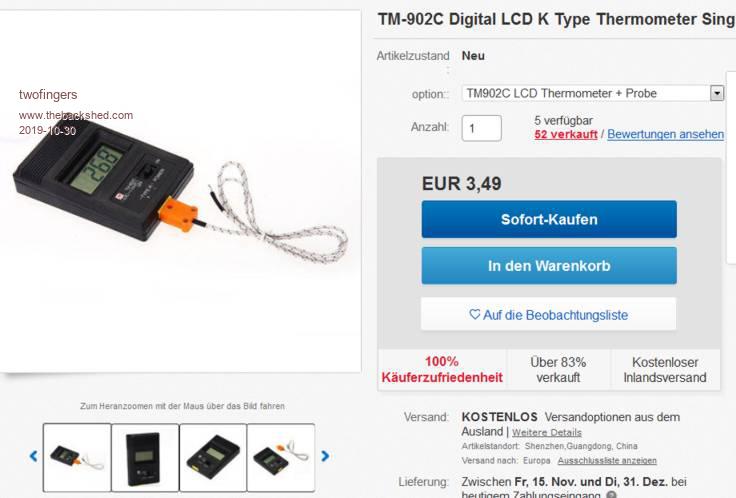 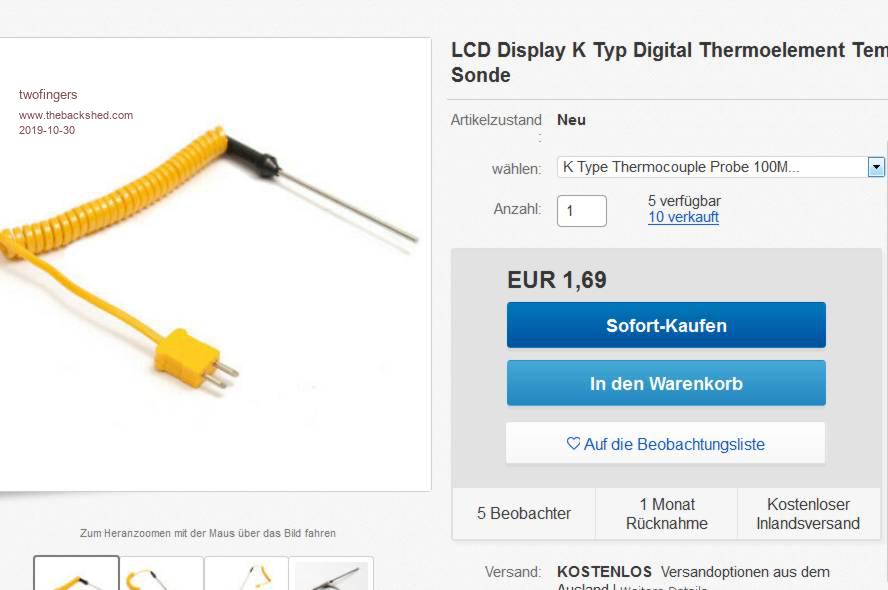 regards Michael Edited 2019-10-30 02:04 by twofingers causality ≠ correlation ≠ coincidence |
||||
| Phil23 Guru Joined: 27/03/2016 Location: AustraliaPosts: 1667 |
On a side note, off topic a bit, I have two different commercial ones. A dual probe Weber, with no Bluetooth & a single probe Bluetooth. Usually use them on the Beef, Turkey, Lamb or whatever sits on the rack in the Hooded BBQ. When it comes to a rolled Pork Roast they are no go as the rotisserie gets put into use. BUT, On two separate occasions, when setting up Pork on the spit I've ask my SO & 19 YO son to put the probes in the roast... Insisted they made sure they were well in, nice & central etc & off they went as instructed. Then when asked if it was right, I just suggested they turn the spit on to check the cables didn't get caught...� (Grin)��. |
||||
| Andrew_G Guru Joined: 18/10/2016 Location: AustraliaPosts: 874 |
Hi Michael, Thanks for the link and I've Googled for more. The inexpensive offerings I've found (I may not have seen them all) seem to not have a meat probe on the end (I want to be able to skewer it into the meat and leave it there while it cooks). The yellow one above does but it is not insulated enough to survive the ~400+C temperatures. It is meant to be plunged into the meat, take a reading, then be withdrawn as the meat is returned to the BBQ. The type I linked to above does have a skewer-type probe and insulation to the connector. By being resistive (rather then a K-type thermocouple) it should be easier to adapt and calibrate (I hope)? Phil - thanks. I am not yet sure how to route any "cable" so it is not damaged by the lid closing. And the electronics can't be too close to the heat either. Cheers, Andrew |
||||
| twofingers Guru Joined: 02/06/2014 Location: GermanyPosts: 1720 |
Hi Andrew, you are right! Here is another, more stable thermocouple. 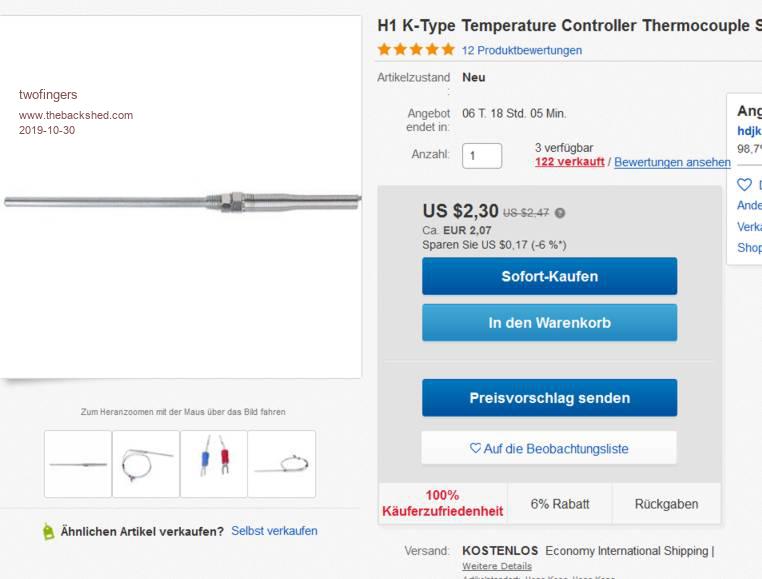 But please do not expect the device to endure 1200 degrees! 400 degrees are probably(?) realistic.  causality ≠ correlation ≠ coincidence |
||||
| MikeO Senior Member Joined: 11/09/2011 Location: AustraliaPosts: 275 |
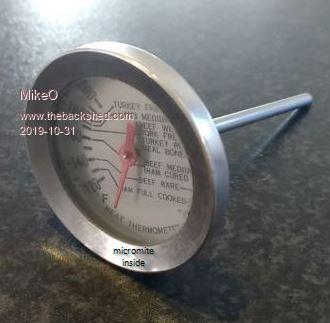 Here's mine,  Codenquilts |
||||
| Andrew_G Guru Joined: 18/10/2016 Location: AustraliaPosts: 874 |
Thanks Mike  , ,Here are two of mine (Oven & BBQ). Cheers, Andrew |
||||
| Volhout Guru Joined: 05/03/2018 Location: NetherlandsPosts: 5703 |
Not sure what is in the Weber probe, but expect it is not silicon, and not NTC/PTC because of the temperatures inside a BBQ. The meat may be 50C (European, centigrade) inside, but the coals/gas is much warmer. In my weber easily 200C. This requires high temp cable, and a sensor that can measure up to several hundred C. Thermocouple is most likely. Linearizing thermocouples may not be needed in the 0C...300C temperature range. You do need an offset compensation though (cold junction compensation). Some 30 years ago I made an instrumentation amplifier (low offset, low drift) by using a quad standard opamp (the 4 amplifiers are thermally coupled, and drift can compensate by using the right circuit). Offset was calibrated out (zero'ed) at 0 degrees C with a potmeter. So you would always get positive voltages at the ADC input. Then the 'cold junction compensation' was done by reading the temperature of a NTC at another ADC pin and adding calculated values from a lookup table. Lots of work to get those right. No linearization done, accurate in 2 degree C between 0 and 300C. Anyway, this is all done inside a max31855, so don't try to re-invent the wheel.... The message however is: make sure you buy a sensor that can measure the temperature you need, and make sure your cable can withstand the high temperatures inside a BBQ. Volhout PicomiteVGA PETSCII ROBOTS |
||||
| Andrew_G Guru Joined: 18/10/2016 Location: AustraliaPosts: 874 |
Hi Volhout, I bought the Weber probe today - as much to play with it as anything else - only Au$20. For the first meter+ the cable is intended to be BBQ-proof (at least 300 deg C) (but they do have short lives). They have a $150 device, called an iGrill that it plugs into to measure its resistance etc. on a nice screen with buttons. I've measured the resistance resulting from temperatures ranging from 0 to 96 degC (ie 240K Ohm to 7K Ohm). The important range is really only 50 to 96 degC, ie 33K to 7K Ohm. Now I know the resistance range, the big question is how to measure it with a MM170? ie How to measure a voltage across say 33k? Cheers, Andrew Here is a plot of the Temperature vs Resistance readings from 50 to 96 deg. 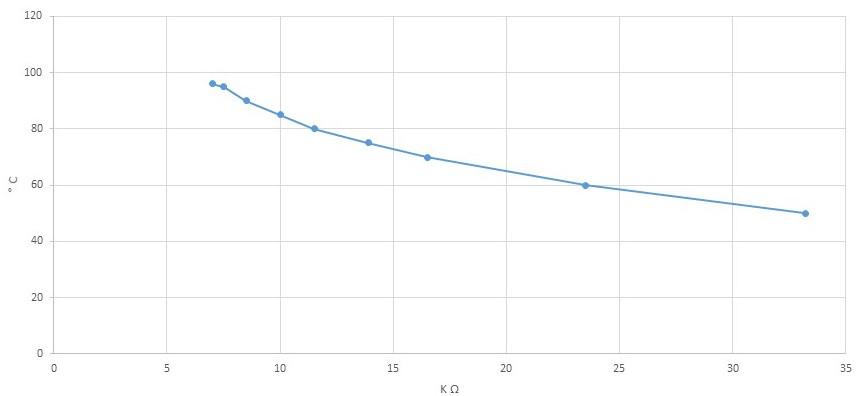 Edited 2019-11-07 19:42 by Andrew_G |
||||
| Volhout Guru Joined: 05/03/2018 Location: NetherlandsPosts: 5703 |
That is simple..... The adc on a mx170 is using the 3.3v as reference voltage. If you connect 3.3v to the probe, and the other pin to the adc. Then connect a 10k resitor from the adc pin to ground you created a temperature dependent voltage divider. When the probe is 7k the voltage at the adc pin is 3.3v x 10k / (7k +10k) = 1.94 volt When the probe is 33k the voltage at the adc pin is 3.3v x 10k / ( 33k + 10k) = 0.77 volt A conversion to temperature can be done with linear interpolation, but better with curve matching using the measurement points you already measured. Success. Volhout P.s. You may get slighlt better resolution if you use a resistor of 15k, in stead of 10k. Replace 10 with 15 in abover formulas. The difference between minimum and maximum adc voltage may be bigger, giving better resolution. Edited 2019-11-08 06:12 by Volhout PicomiteVGA PETSCII ROBOTS |
||||
| Andrew_G Guru Joined: 18/10/2016 Location: AustraliaPosts: 874 |
Many thanks to Volhout and BigMik (who has been helping off-line), Because I will be calibrating the setup it is not critical that each reading is precise. As long as I know a reading of X volts represents Y degrees I'm in with a chance. I have settled on a 22K resistor to earth. That gives me about 0.25V at 0deg, and <3V at 100deg - that range will do me. I had been worried about the internal impedance in the MM (as described at the bottom of page 52 of the manual). I've tested this out on breadboard with fixed resistors - the MM voltage readings are remarkably close to spreadsheet values - but I will still calibrate it. I'll report back in due course, Cheers, Andrew |
||||
| LoidLiu Newbie Joined: 04/12/2020 Location: United StatesPosts: 1 |
Hi! I wanna ask for your opinion about BBQube TempMaster Pro , I really like it. Though the only problem I'm not sure if there is any need for such a high-level temp controller. I would use it only to cook for my family and I don't want to spend my money in vain. |
||||
| Andrew_G Guru Joined: 18/10/2016 Location: AustraliaPosts: 874 |
Hi Loid, Welcome to the TBS forum. Well, I made my unit using an Au$20 (approx) probe see here and bits and pieces I mostly had lying around. The probe cable is about 18" long and plugs in (via a 2.5mm jack) to a U3 box with the electronics and a 2.8" LCD display. (It only shows the internal temperature of the meat - it doesn't control the gas or anything like that). I do find that my $10 mechanical probes are just as effective and are far more robust. I do use both occasionally. I also use it in my oven but my soon-to-arrive new oven has a sensor built in. The project was spurred on by me getting a very nice Weber BBQ. I find that the times in their books - and a bit of practice over the last x decades mean that I usually get it pretty close to "just right". For the $$ you can buy a lot of quality meat . . . but as the guy says in the video "he always wanted one" . . . Does that help (and if you want the code etc I'm only too happy)? Cheers, Andrew |
||||
| logaanjames Newbie Joined: 24/12/2020 Location: United KingdomPosts: 1 |
Most of new pellet grills already have meat thermometer. That one is best of all because it is sent by company in packing. According to me, MAX 31855 is best from all others. |
||||
| Page 1 of 2 |
|||||
| The Back Shed's forum code is written, and hosted, in Australia. | © JAQ Software 2026 |